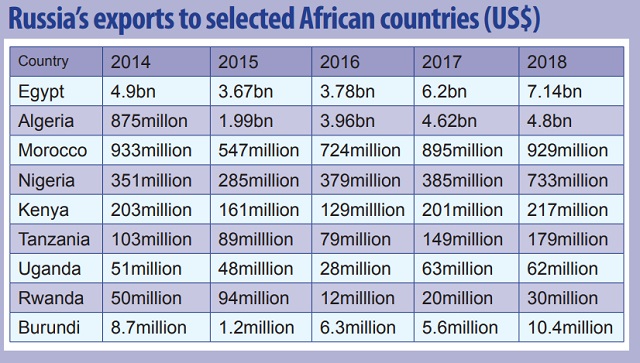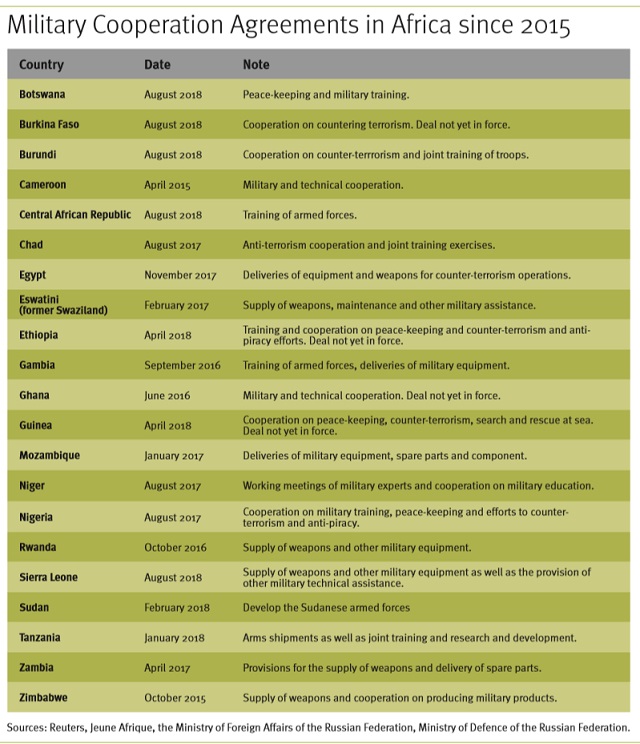
The main importers of Russian arms in Africa, according to the Swedish Defence Research Agency, are Algeria (helicopters, main battle tanks, submarines), Egypt (combat aircraft, long-range air defence systems, helicopters), Angola (fighter jets, main battle tanks, artillery, arms and ammunition), and Uganda (tanks, air defence systems).
Other importers of Russian arms are Mali, Mozambique, Nigeria, Sudan, and Rwanda, and lately Tanzania and Somalia have also made requests for Russian military equipment.Currently, Russia is involved in training Central Africa Republic’s army and presidential guard.
“We are promoting humanitarian ties, both as part of international assistance to Africa’s comprehensive development and on a bilateral basis,” Medvedev said.
“In this new era of RussiaAfrican cooperation, the government of the Russian Federation will do everything in our power to make our partnership a success.”
Medvedev said globalisation had shifted growth to developing countries, making Africa a more important partner for Russia. He said Africa could tap into Russia’s decades-old business and industrial expertise to boost domestic capacity and exploit opportunities.
China and India
This development comes as Afreximbank’s latest trade report shows that the continent’s total merchandise trade grew from US $907.63bn in 2017 to US $997.9bn in 2018, making it one of the fastest growing regions in the world.
The report also notes that whereas EU remained Africa’s main continental trading partner in 2018 – accounting for 29.8% of total trade, African trade with the South grew significantly over the last decade to account for more than 35% of the continents total trade in 2018.
However, China and India consolidated their positions as Africa’s first and second single largest trading partners, accounting for over 21% of the total African trade in 2018. IntraAfrican trade also increased steadily in 2018, growing by 17% to reach US $159bn.
Prof. Benedict Oramah, the president of Afreximbank said the Russian Federation represents one of such partners that Africa looks up to.
“Russia could be a source of investment goods that Africa needed to develop its infrastructure and could transfer critical technology in digitisation and in mining and processing of raw materials. It could also be a source of non-debt creating investments in key areas such as rail, aviation, healthcare, and petrochemicals,” he said.
“The traditional international relationships of the African continent are changing rapidly as we forge ever closer links with emerging partners who are eager to assist the economic development of Africa through sectoral and infrastructure investments across the continent and embrace ever stronger trading links.”
“Russia, in particular is forging a new relationship with Africa, as are other SouthSouth emerging partners, which, in tandem with the African Continental Free Trade Agreement, gives me great confidence that Africa is well positioned to ride this era of global trade tensions that threaten to damage other continental economies,” Oramah added.
Vera Songwe, the executive secretary for the United Nations Economic Commission for Africa, said the only way African countries can benefit from trade partnerships including Russia is to not only diversify their economies but also specialise in producing and exporting commodities for which they have a comparative advantage, while importing those for which they lack comparative advantage.
She said diversification also increases a country’s ability to meet objectives such as job creation and improvements in income distribution.
Exercise caution
Prof. Theo Neethling, the head of Political Studies and Governance in the Humanities Faculty, at the University of the Free State in South Africa wrote in Quartz Africa on Feb.08, this year, that a combination of Russia and China will surpass the combined North America and Europe in terms of global power – based on GDP, population size, military spending and technological investment.
“For African leaders, the key word is agency and the question is how to play the renewed Russian attention to their countries’ advantage, and not to fall victim to the contemporary “geopolitical chess” game played by the major powers on the continent,” he said.
And as Putin hosts African head of states for business deals in October, Prof. Ha-Joon Chang from Cambridge University said it is critical that developing countries remain cautious as they enter into new trade partnerships with developed countries.
“We must reject the idea of a level playing field between developed and developing countries. Free trade is only beneficial between countries with the same level of development, which is why the Africa Continental Free Trade Area is so important,” he said in his keynote address during Afreximbank AGM in Moscow.
The AfCFTA that is expected to provide a market of more than 1.2billion people, with a combined GDP of US$2.6 trillion, enters into force during the next African Union Summit to be held in Niamey, Niger on July 07.

****
 The Independent Uganda: You get the Truth we Pay the Price
The Independent Uganda: You get the Truth we Pay the Price



